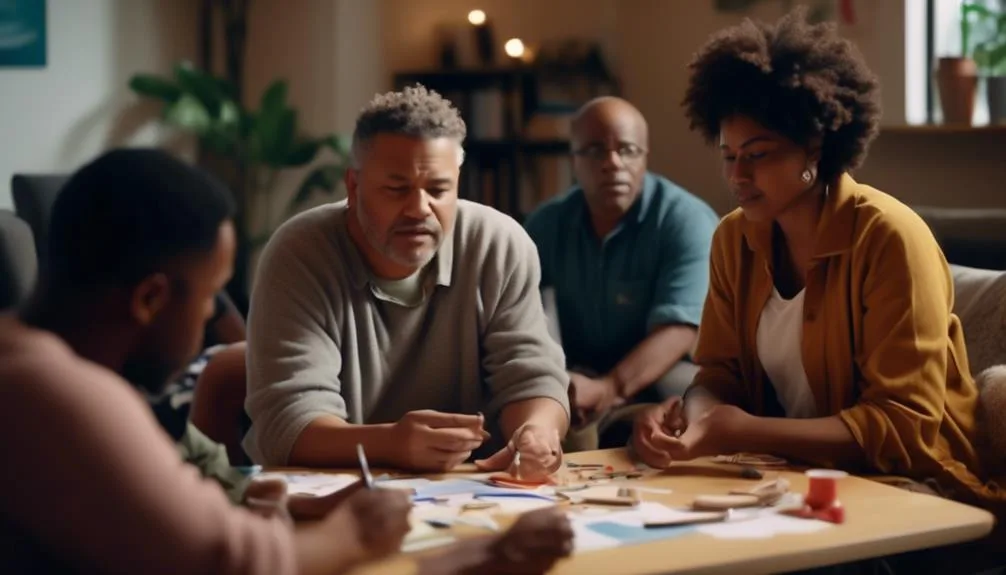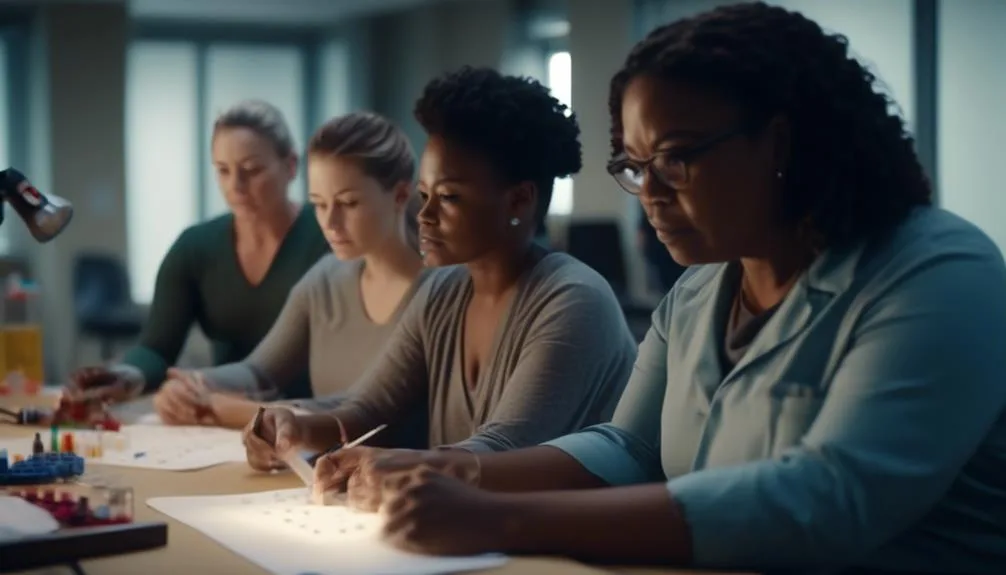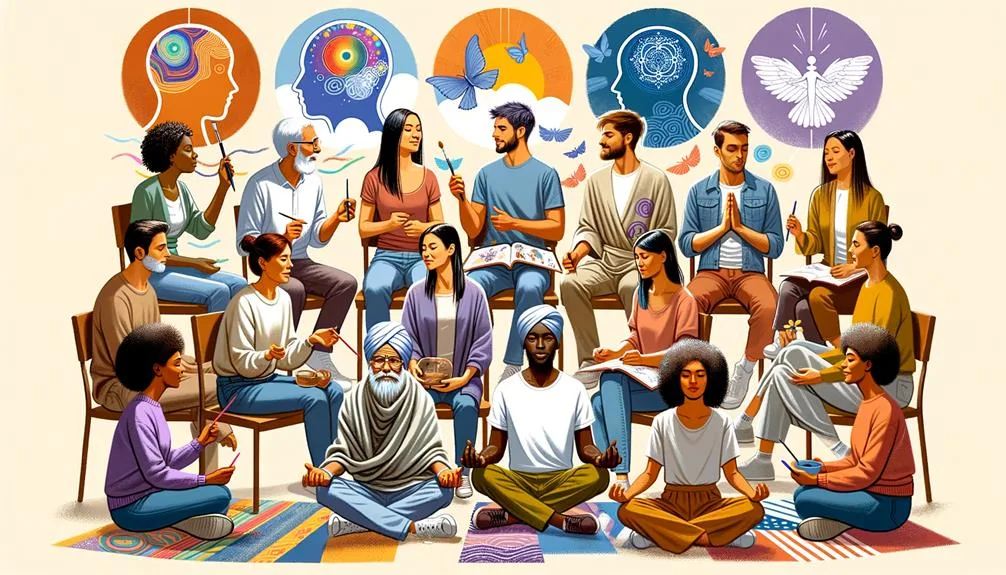Are you ready to unlock the potential of game-changing therapy techniques that are revolutionizing the field of mental health?
Step into a world where innovative interventions hold the key to overcoming challenges, enhancing well-being, and fostering personal growth.
From the captivating Miracle Question of solution-focused therapy to the power of open-ended communication techniques and the transformative Voice Dialogue method, a treasure trove of approaches awaits you.
But that's just the beginning. Prepare to delve into essential skills, therapeutic interventions, interactive worksheets, intriguing alternative ideas, and much more.
Brace yourself for a journey that will not only expand your knowledge but also empower you to transform your own life.
Key Takeaways
- Solution Focused Therapy, Cognitive Behavioral Therapy (CBT), Dialectical Behavioral Therapy (DBT), and Eye Movement Desensitization and Reprocessing (EMDR) are effective therapeutic intervention approaches.
- Therapists should possess essential skills such as empathy, self-management, listening skills, setting boundaries, and authenticity.
- Worksheets, activities, and techniques like mindfulness exercises, journaling prompts, breathing techniques, and art therapy can be used in therapy sessions.
- Alternative therapy ideas like nature therapy, music therapy, animal-assisted therapy, virtual reality therapy, and expressive writing therapy can be explored for additional benefits.
Solution Focused Therapy Techniques
Solution Focused Therapy Techniques offer a practical and goal-oriented approach to therapy, empowering individuals to focus on their strengths and find solutions to their challenges.
One powerful technique used in Solution Focused Therapy is the Miracle Question. This question invites individuals to imagine a future where their problem is solved, allowing them to explore their desired outcomes and what steps they can take to achieve them.
Open-ended questions are also utilized in Solution Focused Therapy to encourage individuals to reflect and explore their own thoughts and feelings. These questions promote self-reflection and help individuals gain insight into their own strengths and abilities.
Essential Skills in Therapy

Now let's explore the essential skills that therapists possess, allowing them to effectively guide individuals on their journey towards healing and growth. Therapists are equipped with a range of skills that enable them to create a safe and supportive environment for their clients. One crucial skill is setting boundaries, which helps establish a clear framework within the therapeutic relationship. By setting boundaries, therapists ensure that both they and their clients feel respected and safe. Additionally, self-management is another vital skill that therapists possess. It involves managing their own emotions, reactions, and biases during therapy sessions, enabling them to stay focused and provide the necessary support to their clients. Through these essential skills, therapists create a foundation for effective therapy and facilitate positive change in the lives of those they work with.
| Essential Skills in Therapy | ||
|---|---|---|
| Setting Boundaries | Self-Management | Listening Skills |
Therapeutic Intervention Approaches

Therapeutic intervention approaches offer individuals the opportunity to explore and address their emotional and mental health concerns in a supportive and effective manner.
When it comes to addiction intervention strategies, therapists employ a range of techniques to help individuals break free from the grip of addiction. These strategies may include motivational interviewing, cognitive-behavioral therapy, and family therapy, among others. By combining these approaches, therapists can help individuals gain insight into their addictive behaviors, develop coping skills, and repair relationships that may have been damaged by addiction.
Another powerful therapeutic intervention approach is play therapy. This technique is particularly effective for children, as it allows them to express their thoughts and emotions through play. Through various play therapy techniques, such as storytelling, art, and role-playing, children can safely explore their feelings, build self-esteem, and develop problem-solving skills.
Play therapy provides a nurturing environment where children can heal and grow.
Worksheets and Activities for Therapy Sessions

When it comes to providing effective therapy sessions, incorporating worksheets and activities can be a valuable tool for you to engage in self-reflection and promote personal growth. These interactive exercises not only enhance your therapeutic experience but also allow you to actively participate in your own healing journey. Two powerful techniques commonly used in therapy sessions are mindfulness exercises and art therapy activities.
Mindfulness exercises help you cultivate present-moment awareness and improve your overall well-being. By focusing on your breath, body sensations, or the environment around you, you can develop a greater sense of calm, reduce stress, and increase self-awareness. Art therapy activities, on the other hand, provide a creative outlet for self-expression. Engaging in artistic endeavors such as drawing, painting, or collage-making can help you process emotions, explore subconscious thoughts, and gain insight into your inner world.
Incorporating these worksheets and activities into your therapy sessions can greatly enhance your progress and deepen your understanding of yourself. Take a look at the table below for some examples of mindfulness exercises and art therapy activities that you can try:
Mindfulness Exercises | Art Therapy Activities
——————- | ———————
Body scan meditation | Mandala coloring
Guided breathing exercises | Collage-making
Sensory awareness practice | Clay sculpting
Tests, Assessments, and Questionnaires in Therapy

To better understand your needs and progress in therapy, various tests, assessments, and questionnaires are utilized to gather valuable information about your psychological well-being and guide the therapeutic process. These tools provide a structured and systematic way to assess your symptoms, emotions, and overall mental health.
Here are four commonly used tests and questionnaires in therapy:
- Beck Depression Inventory (BDI): This questionnaire helps assess the severity of depressive symptoms and is commonly used to diagnose and monitor depression.
- State Trait Anxiety Inventory (STAI): This assessment measures both temporary (state) and long-term (trait) anxiety levels, helping therapists understand your anxiety symptoms and their impact on your daily life.
These tests and questionnaires provide therapists with objective data to inform treatment planning and monitor progress. They allow for a more comprehensive understanding of your psychological well-being and help tailor therapy to your specific needs.
Interesting and Alternative Therapy Ideas

Explore unique and innovative therapy approaches that can bring a fresh perspective and enhance your therapeutic journey.
Nature therapy is an interesting alternative therapy idea that incorporates the healing power of nature. By immersing yourself in natural environments, such as forests or gardens, you can experience reduced stress, improved mood, and increased relaxation. Nature therapy can be as simple as taking walks in nature or participating in activities like gardening or birdwatching.
Another intriguing option is expressive writing therapy, which involves using writing as a tool for emotional expression and self-reflection. Through writing, you can explore your thoughts, feelings, and experiences in a safe and structured way. This therapeutic approach has been shown to promote emotional well-being, enhance self-awareness, and facilitate personal growth.
Consider incorporating these unique therapy ideas into your journey for a holistic and transformative experience.
Frequently Asked Questions
How Can Solution Focused Therapy Techniques Be Adapted for Working With Children and Adolescents?
To adapt solution focused therapy techniques for children and adolescents, you can tailor the therapy to their specific needs and developmental level. Use age-appropriate language, engage them in creative activities, and involve their families for better outcomes.
What Are Some Practical Strategies for Therapists to Improve Their Listening Skills?
To improve your listening skills as a therapist, try implementing practical strategies such as active listening techniques. These strategies can help you truly understand your clients, empathize with their experiences, and provide insightful guidance in their therapeutic journey.
How Does Eye Movement Desensitization and Reprocessing (Emdr) Therapy Work to Treat Trauma?
Eye movement desensitization and reprocessing (EMDR) therapy is like rewiring your brain. It uses eye movements to process traumatic memories, reducing their emotional impact. EMDR therapy has research-supported benefits but also limitations. There are alternative trauma therapies available too.
Can You Provide Examples of Specific Breathing Techniques That Can Be Used in Therapy Sessions?
In therapy sessions, you can try diaphragmatic breathing, where you focus on deep belly breaths, and box breathing, where you inhale, hold, exhale, and hold again in a pattern. These techniques can help promote relaxation and reduce anxiety.
How Can Expressive Writing Therapy Be Incorporated Into a Therapy Session to Promote Healing and Self-Reflection?
How can expressive writing therapy be incorporated into a therapy session to promote healing and self-reflection? By encouraging you to write about your thoughts and emotions, expressive writing therapy promotes emotional healing and enhances self-awareness.
Conclusion
Congratulations! By exploring these game-changing therapy techniques, you have unlocked a treasure trove of tools and strategies that can help you navigate the complexities of your mental health journey.
Just like a skilled architect, you now possess the blueprints to build a stronger, more resilient foundation for your well-being.
Remember, therapy isn't a one-size-fits-all approach, but with these diverse methods at your disposal, you have the power to shape your own path towards personal growth and fulfillment.
Let the transformative power of therapy guide you towards a brighter tomorrow.

